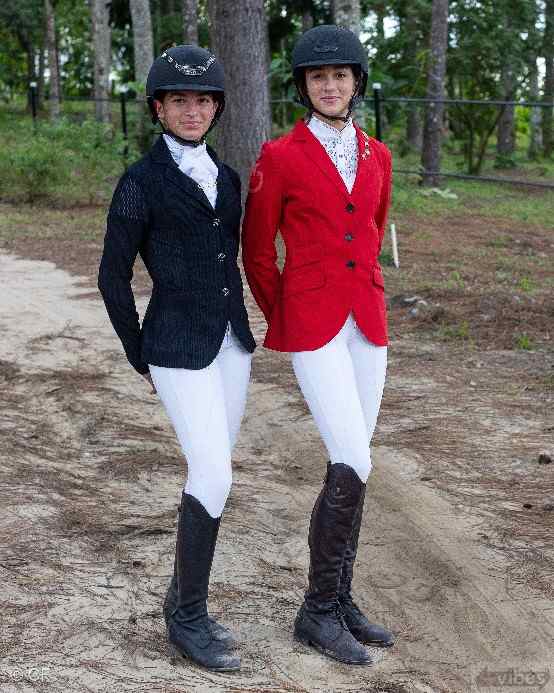Equestrian Sisters Justynne and Jaimie Fletcher
By Kimberly Wallace

To observe equestrian sisters Justynne and Jaimie Fletcher in their element, one would have to see them dressed in their navy jackets, white jodhpurs and riding helmets as they and their horses take to the ring.
At 16 and 14, respetively, the sisters aren’t your typical teenagers who spend hours on their phones texting or scrolling — far from it. Rather, they’re laser focused athletes. Five days a week (Saturdays and Sundays included) the girls make the trek to Freeport where they train for 2-3 hours. The time and effort they pour into the sport has been more than worth it; their equestrian achievements at international competitions have earned them a place among T&T’s most promising equestrian athletes.
When the girls were little, the family was on holiday in Ocala, Florida when they saw a sign advertising horse riding classes. At the age of four Jaimie had her first lesson, Justynne joined in and fell in love with it. What started as a hobby has now become their lifestyle.
With about three registered stables and 20 athletes and leisure riders, the equestrian community in Trinidad is quite small.
“Until we started to compete and travel, we didn’t realise how big the sport actually was,” said Justynne.
The equestrian sport takes a village, says Jaimie. Excelling depends on the athlete’s commitment to the sport, their dedicated coach, trainers, veterinarians, family of the athlete and of course the horse, and how well the athlete connects with the horse. Horses are like humans; they have personalities and quirks so it’s crucial to get along with them.
“When you’re riding a horse there is always a danger aspect to it,” says Jaimie. “If you aren’t connecting with a horse properly, there can be miscommunication which can lead to an injury. You must have a connection with the horse in order to understand each other and speak to each other in an unspoken language.”
Jaimie has had her horse, Louvre, for the past four years, and knows his likes and dislikes. And Justynne has come a long way with her horse Capers. Both horses were bred for horse racing, they went through “rehoming”, a process which involves rehabilitation and allowing the horse to pasture and heal. Once given the all-clear they were trained for the equestrian sport where both athlete and horse perform a delicate ritual – the horse must learn to listen to aids like leg movements and the athlete learns how to sit and hold the reins.
The equestrian sport is demanding and requires hard work, commitment and passion. Each training session begins with cleaning the horses’ hooves, brushing the horses, warming them up for 15 minutes, then riding for 35 minutes. After the training session, the sisters bathe their horses, pamper them with treats, feed or lead them out to pasture. Both Justynne and Jaimie have represented T&T in Colombia, Ecuador, Guatemala and the US. When they compete abroad, they use borrowed horses. If that sounds pretty straightforward, it’s not.
The choice of horses is a lottery where one’s name is chosen out of a bag that contains the names of riders who are qualified for each level. Before confirming which horse to compete with, the sisters trot and cantor with a potential horse for 45 minutes to see whether it responds to their commands. After building a connection they embark on five days of competition.
“The sport has taught me a lot about self-discipline and time management, I’ve learned how to work around things, deal with the workload of school and go for a riding lesson afterwards. It has also taught me how to accept and deal with loss; we don’t always need to win to learn a lesson,” says Justynne.
Jaimie agrees.
“It’s taught me responsibility – taking care of another being that can’t always take care of itself,” she says. “And even though I may be tired, I owe it to myself and my coaches to do my best in each lesson. It’s also important to have confidence; if you don’t, the horses can sense that.”
In the Fletcher household, the equestrian sport is very much a family affair. Their mother Inga takes care of the horses and assists as a groom, while her husband Clive is the photographer for the Trinidad and Tobago Equestrian Federation (TTEF). Each vacation revolves around horses and training camps where the sisters learn from dressage, jumping and eventing specialists, so that they can become better riders.
“I believe the sport is the best training tool for any child,” says Inga.
Many are oblivious of the power of interacting with a horse and how much it benefits the handicapped, blind and deaf children and those with learning and behavioural difficulties, she adds. Every Tuesday morning, the TTEF’s Equestrian Spirit programme hosts children from the School for the Blind and the Princess Elizabeth Centre, where they have one-on-one time with the horses.
Justynne and Jaimie’s days are carefully orchestrated around school, horses and family life. Jaimie has plans to qualify and compete in more international competitions and Justynne has her eyes set on possibly participating in the Olympic Games in the future.
Horse riding, as it turns out, is a lot like life. Justynne and Jaimie have fallen off horses and broken some bones, but it has taught them grit. Rather than give up, they saddle up and get back on. At a time when so many young people feel lost and misunderstood, the Fletches’ advice to their peers is to communicate their feelings to a trusted adult and find a positive hobby that they really enjoy. Then, no matter what comes their way, it will be easier to get back on the saddle and grab life by the reins.
Featured photo: Equestrian sisters Justynne and Jaimie Fletcher. Photo: Gary Jordan Photography
